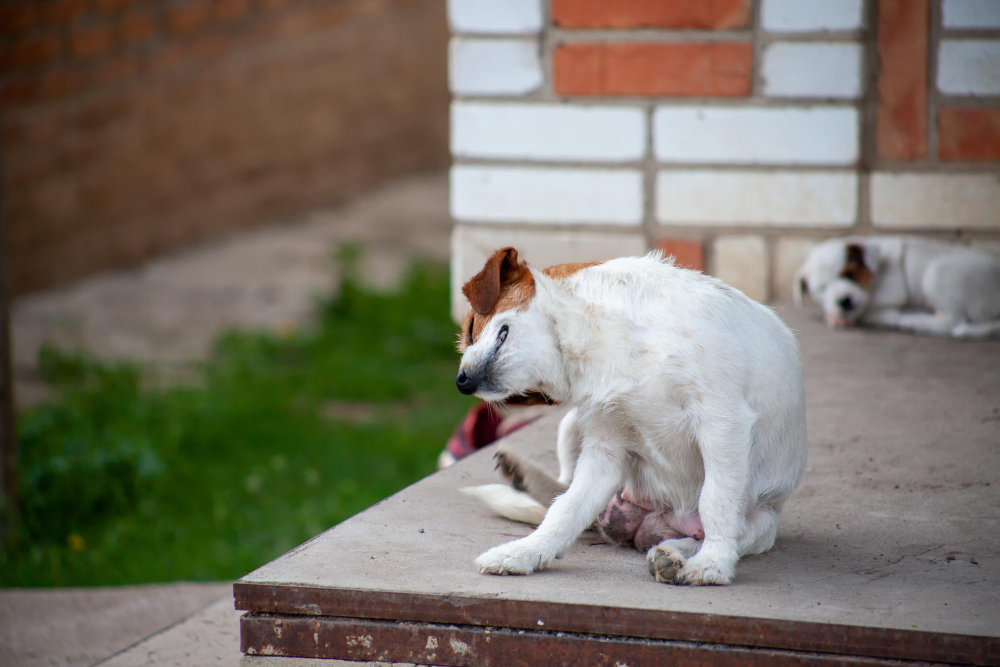In the world of pet parenthood, certain behaviors are to be expected. But when my dog is constantly scratching and biting himself, it raises red flags. As pet parents, we’re left scratching our heads, asking, “why is my dog so itchy but has no fleas?” This article will shed light on why your dog keeps scratching, how much is normal, and offer some advice to help your itchy friend.
The Mysterious Itch: Understanding Why Your Dog is Constantly Scratching And Biting Himself
Perhaps even more concerning is when my dog is constantly scratching and biting himself and losing hair. The reason for this can vary. Dogs may suffer from allergies, just as humans do. Food, pollen, dust mites, or insect bites can all trigger an allergic reaction. Dry skin, often a result of seasonal changes or a lack of humidity, can also cause excessive itching. Furthermore, skin infections, hormonal imbalances, or more serious conditions like immune diseases may lead to constant scratching. If hair loss accompanies the scratching, it’s worth a visit to the vet. Check our guide to common dog allergies for more detailed information.
The Invisible Pests: Why Your Dog is Always Scratching But Doesn’t Have Fleas
When your dog scratches but doesn’t have fleas, it can be baffling. Here, it’s important to realize that fleas aren’t the only parasites that cause itchiness. Mites, ticks, and lice can cause your dog to scratch. So even when my dog is always scratching but doesn’t have fleas, it could still be down to other pests. You’ll need to investigate further, perhaps even consulting with your vet to be sure. Some dogs have a genetic predisposition for the so-called “atopic dermatitis”. Atopic dermatitis affects a significant number of the canine population in some countries and some breeds such as Labrador retrievers, French bulldogs and German shepherds are at greater risk than others. Atopic dermatitis occurs because your dog’s immune system is overreacting to a normal environmental or dietary element, overreacting. This causes you to scratch vigorously, trying to ease the discomfort. This behavior can occur when the skin becomes cracked or ulcerated, making the dog more susceptible to contracting other infections.
Focus on the Belly: Unraveling the Reasons Why Your Dog Keeps Scratching His Belly
A dog keeps scratching belly areas for a number of reasons. The skin on a dog’s belly is thinner and thus more sensitive. Parasites, allergies, or irritations can cause this specific itch. In some cases, a dog scratching its belly with its hind legs might be an attempt to reach an itch caused by a wound or lump hidden beneath the fur. This behavior could also be a result of stress or anxiety.
Scratch-Free Zone: How to Help Your Dog Stop Scratching Himself
Scratching, in and of itself, is not a bad thing. Dogs scratch as a natural response to itchiness or irritation. However, when it becomes excessive, it can lead to issues like hair loss, sores, or infections.
The first step to take when your dog can’t stop scratching is to identify the underlying cause. A vet check-up might be necessary to rule out medical conditions. Once you have identified the root cause, appropriate treatment can begin. In some cases, a change in diet might be needed. If the issue is dry skin, investing in a pet-friendly moisturizer might be beneficial.
Remember, prevention is better than cure. Regular grooming and a balanced diet can do wonders for your dog’s skin and coat health. Keeping up with your dog’s flea and tick prevention is another key step, and our guide on maintaining a flea-free dog offers invaluable advice.
Scratching: A Dog’s Normal Behavior or Cause for Concern?
Is it normal for a dog to scratch every day? Yes, to an extent. Scratching is a normal canine behavior. However, it’s the intensity and frequency that should inform whether it’s a cause for concern. If your dog scratches occasionally, it’s likely not a problem. If it’s constant and seems to cause distress, it’s time for a deeper look.
How to know if your dog is scratching more than usual?
If your dog is scratching more often and for a longer period of time, then something might be wrong. If he has injuries, or hair loss in any area (especially where it itches), or uses his mouth to scratch, you should take him to the vet to find out how his health is.
Conclusion
While it’s normal for dogs to scratch, constant scratching, especially without the presence of fleas, might signal an underlying issue. Remember to consult your vet if you’re worried about your dog’s scratching behavior.
Feel free to share your experiences or ask further questions in the comment section. We’re here to ensure the health and happiness of our furry friends!

